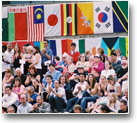Matthew James Hamilton
President’s Medal Winner
Darlingford, Manitoba
 Theory, Culture and Politics (TCP)
Theory, Culture and Politics (TCP)
Year:
2008-2010 (Two-year M.A. program)
What does winning the President’s Medal mean to you?
Considering the quality of the graduate students at Trent, winning this award is a tremendous honour. I think what is most gratifying about this recognition is that it affords me an opportunity to thank all those faculty and colleagues who have contributed so much to my academic experience, in short, to let them know the positive impact that they have had.
How will you make a difference with your Trent degree?
I think a good way to shape your aims for the future is to emulate those whom you respect and admire. I will try to follow the path of TCP faculty who have had a tremendous impact on me, specifically my supervisor Alan O'Connor, TCP director Doug Torgerson, and Canadian Research Chair Davide Panagia. The most important thing TCP faculty imparted upon me is what it takes to produce good work at the M.A. level. From how to read a text, to how to compose an effective and nuanced argument, they convey these difficult lessons with ease and encouragement, allowing me to produce the best work I can. This made my M.A. a great experience.
Future goals:
I am working on the next step in this long process – preparing to write my comprehensive exam in political theory to conclude my first year of the Political Science Ph.D. program at University of Toronto.
My hope for the future is that I will be in a position to continue my work, to pursue my research interests, and hopefully, through the expression of this work, make some modest change in the world, or at least to leave a positive impression on those I teach. While my first passion is research and writing, I am also tremendously motivated by the prospect of helping shape the minds of young students and aspiring scholars.
What is the best thing about studying at Trent?
TCP faculty is drawn from a variety of departments. I took courses from professors who specialize in political science, cultural studies, philosophy, and English. Because of this I was exposed to a multitude of diverse approaches to theory. The faculty also demonstrated incredible dedication to students – one course routinely ran hours past its scheduled time, but the professor stayed because he cared about his students’ learning and the students stayed because he was an excellent professor. My thesis supervisors would routinely make impromptu plans to meet for coffee and discuss my thesis progress. These same faculty members were actively involved in helping me choose and then apply for Ph.D. programs. I simply cannot imagine such an encouraging, personable and fertile learning environment at most other Universities.
Why did you choose Trent?
I chose Trent’s TCP program because it offered a unique, interdisciplinary approach to contemporary theory I felt would suit my academic interests. The faculty who teach courses and are available to supervise thesis work in TCP are first rate. Also, because the program is small, Trent offers an intimate learning environment and unparalleled opportunities for close interaction with faculty.
Extracurricular activities:
During my time in Peterborough I was fortunate to enjoy the wonderful company of my (TCP) colleagues. Because TCP is a relatively small program, (accepting five to ten students per cohort) it fosters close-knit relationships, no doubt established during the annual weekend trip to Windy Pine held each fall. I became a tennis enthusiast over the course of my two summers spent in Peterborough. Peterborough is lucky to have the most wonderful clay court tennis facilities nestled along the banks of the river in East City, and the people at the club were welcoming and instrumental in helping me learn the game. I also participated in the local Running Room program in preparation for running a half-marathon. I am happy to report I just completed my first half-marathon in Toronto.
Interests and passions:
My most serious interest is studying contemporary political theory and philosophy. Like an engrossing novel, the further you climb into the field, the more rich the experience becomes, which tends to open up further and more urgent questions. It is the drive to make sense of these questions and challenges that keeps the work interesting for me - theoretical work is not as it is often portrayed, dry and abstract, but rather quite rich and creative. In the few moments outside of academic life I enjoy sports, reading literature, cooking, and yoga.



